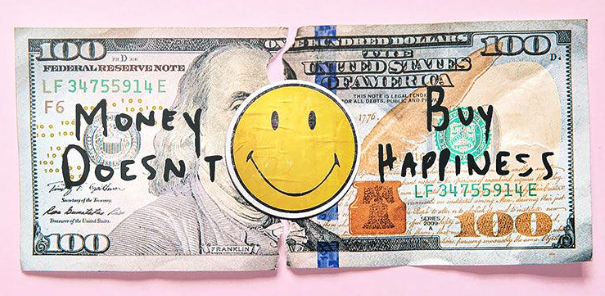Why Money Can’t Buy Happiness
May 15, 2023
The saying that “Money doesn’t buy happiness” is just an old platitude, but is it really accurate?
For the most part, yes, money can not buy a person’s long-term happiness.
In an article by Psychology Today, there was a study done to answer this question. The people conducting the study (Daniel Kahneman and Angus Deaton) found a difference between emotional well-being and life evaluation.
They defined emotional well-being as “…the emotional quality of an individual’s everyday experience—the frequency and intensity of experiences of joy, fascination, anxiety, sadness, anger, affection that make one’s life pleasant or unpleasant.”
Life evaluation, on the other hand, “refers to a person’s thoughts about his or her life.”
Though spending money can improve emotional well-being in the short-term, it doesn’t have much of an impact on a person’s life evaluation as a whole, which, depending on who you ask, is more important.
How high are your expectations for yourself?
People with a lot of money will often put higher standards on themselves, stressing about when and how they can get even more money.
It can be argued that within special circumstances, spending money can make a person more happy. However, the happiness that comes with this won’t last forever, which is why it’s more important to focus on different goals that don’t revolve around how much money you have or earn.
One of the goals that people will consistently say is their biggest, is to be a good parent (as stated by The American Psychological Association).
The APA asked these people how money gets in the way of this goal, to which they responded with specific worries, such as “the way their children would be treated by others and stereotyped as rich kids or trust fund babies,” parents also “wondered if their children would know if people really loved them or their money, whether they’d know if their achievements were because of their own skills, knowledge and talent or because they have a lot of money.”
In addition to this, it’s been proven that having too much money can actually make a person unhappy in certain situations.
Imagine winning the lottery, and being ecstatic, because what are the odds of that? But your excitement is short-lived, because your phone then becomes flooded with messages and calls from family, friends, even people you haven’t spoken to in years, all asking you for money.
The National Endowment for Financial Education stated that 70% of lottery winners will go bankrupt within the next few following years. This is due to the fact that getting a lot of money at one time will lead to spending without thinking.
Not only do most lottery winners go bankrupt, but additionally: “Obtaining more money often leads to careless spending and the desire to get more money, and the greed can be destructive to the lives of winners and their families.”
Rich people are susceptible to sadness, disappointment, grief, and stress just like everyone else is. Having more money won’t make these things disappear.
At the end of the day, happiness is a temporary emotion. Long-term fulfillment and satisfaction are much more valuable than the short-lived feelings of happiness that come with spending money.




































